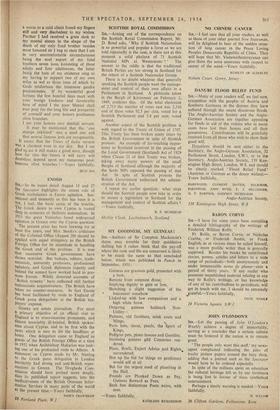SCOTTISH ROYAL COMMISSION
SIR,—Arising out of the correspondence on the Scottish Royal Commission Report, Mr. D. Bond asks, ' Why if Scottish Nationalism is so powerful and popular a force as we are told repeatedly is the case, is there not at this moment a solid phalanx of 71 Scottish
National MPs at Westminster ? ' The answer to the riddle is that the traditional British Parties are too strong in Scotland for the return of a Scottish Nationalist Group.
There is no doubt whatever that generally speaking the Scottish people want the manage- ment and control of their own affairs in a Parliament in Scotland. A plebiscite taken in the Burgh of Kirricmuir on February 1, 1949. confirms this. Of the total electorate of 2,715 the number of votes cast was 2,310 and of these votes 92.3 per cent. voted for a Scottish Parliament and 5.4 per cent. voted against.
Another aspect of the Scottish problem is with regard to the Treaty of Union of 1707. This Treaty has been broken many times by the British Government in spite of Scottish protests. An example of far-reaching impor- tance to Scotland occurred in the passing of the Local Government (Scotland) Act of 1929 when Clause 21 of that Treaty was broken, taking away many powers of the small Burghs of Scotland although the majority of the Scots M Ps opposed the passing of that Act. In spite of Scottish protests the British Government authorised the admini- stration of the Act.
I repeat my earlier question: what steps should the Scottish people now take in order to secure a legislature in Scotland for the management and control of Scottish affairs ? —Yours faithfully, R. E. MUIRHEAD Meikle Cloak, Lochwinnoch, Scotland


































 Previous page
Previous page